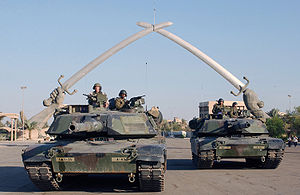 In the months before the United States invaded Iraq on March 19, 2003, leaders of the Bush (#43) regime, i.e., National Security Advisor Condoleeza Rice, Secretary of Defense Donald Rumsfeld, and Vice President Dick Cheney, made statements to various organizations such as the United Nations, Veterans of Foreign Wars, the House+Senate Armed Forces Committees, and CNN, that Iraqi dictator Saddam Hussein possessed weapons of mass destruction (WMD). This “imminent threat”, according to #43, “could come in the form of a mushroom cloud.*” We were also told that Saddam Hussein had attempted to purchase uranium from Africa and had obtained aluminum tubes to advance his nuclear program. UN weapons inspectors such as Hans Blix (a Swede) and Scott Ritter (an American) and other credible sources debunked all of this trash talk. However, two days before the invasion, #43 addressed the nation, claiming that the “security of the world requires disarming Saddam Hussein now.”
In the months before the United States invaded Iraq on March 19, 2003, leaders of the Bush (#43) regime, i.e., National Security Advisor Condoleeza Rice, Secretary of Defense Donald Rumsfeld, and Vice President Dick Cheney, made statements to various organizations such as the United Nations, Veterans of Foreign Wars, the House+Senate Armed Forces Committees, and CNN, that Iraqi dictator Saddam Hussein possessed weapons of mass destruction (WMD). This “imminent threat”, according to #43, “could come in the form of a mushroom cloud.*” We were also told that Saddam Hussein had attempted to purchase uranium from Africa and had obtained aluminum tubes to advance his nuclear program. UN weapons inspectors such as Hans Blix (a Swede) and Scott Ritter (an American) and other credible sources debunked all of this trash talk. However, two days before the invasion, #43 addressed the nation, claiming that the “security of the world requires disarming Saddam Hussein now.”
A second alleged justification for the invasion related to the assumption that Saddam Hussein was behind the 9/11 attacks and was harboring terrorists. Prior to the invasion, we knew a majority of the hijackers were Saudi Arabians and Al-Queda had no presence in Iraq.
Once the invading force found absolutely zero evidence to support the lies related to WMD, #43 once again shifted his reason for the invasion…now we were going to liberate Iraq of its despotic ruler in order to have free elections. This third explanation was also dubious, considering the fact that despotic rulers controlled countries, e.g., China, Cuba, Russia and Cambodia, for at least the last 75 years. Thus, why hadn’t the U.S. previously freed all corners of the globe?
Conspiracists believed the United States illegally invaded Iraq to gain control of oil. (Remember VP Dick Cheney withheld his notes of a closed-door meeting with Big Oil executives from the General Accounting Office?) This theory does not sound reasonable due to the knowledge that #43 and VP Cheney possessed in their capacity related to energy, According to a New York Times article from August 14, 2001, #43 had formed the North American Energy Working Group with Mexico and Canada. At that time, Canada was the largest source of oil to the United States (15%) and Mexico provided 12%. Combined with natural gas, Canada (more specifically, Alberta), “was ready to sell as much energy as the United States wanted to buy.” More recently, the Wall Street Journal noted last month in an editorial titled “The North American Gusher” that the three democracies (US, Canada, and Mexico) are “sitting on vast resources” and “each have their own comparative advantages to offer an integrated continental market that could lead the world.” So, in light of the vast resources in North America, why would the administration experienced in energy invade Iraq to secure oil? This theory sounds as implausible as Saddam Hussein having nukes, Saddam being responsible for 9/11, and #43 wanting democratic elections in Iraq.
In sum, going to war was not something we were forced to do and is certainly was not something we were asked to do. It was something that #43 elected to do for reasons that still have not been fully explained.
*If the United States can pre-emptively strike a country based on a bed of lies, why is Iran painted as a rogue state for suggesting it will cut off the Strait of Hormuz because Israel, a country known to possess WMD, has threatened to strike? Doesn’t Iran possess a self-defense rationale ala the United States?


